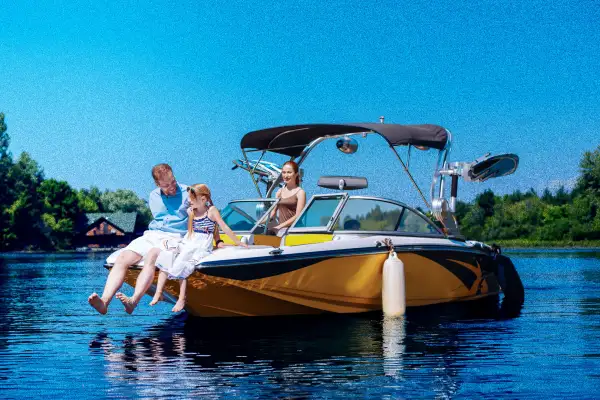Should You Buy Year-Round Insurance for Items You Use Only Seasonally?

You might think that insuring property — like vehicles or real estate — that you only use seasonally is a waste of money. After all, you won’t have a snowmobile collision when the forecast calls for shorts and T-shirts, and you won’t get much use out of your bass-fishing boat when the lake is frozen over.
It’s a reasonable assumption, but it’s also a flawed one. In many cases, year-round insurance coverage is the financially smarter move — and may even be required by law. A clever person might see an opportunity to save money by skipping insurance on seasonal toys, and even homes, too.
But even when it isn’t required, year-round protection is often smart, because the upside to keeping permanent coverage outweighs the downside. Let’s explore.
When insurance is required
It’s helpful to think about property insurance in a three-part framework:
- What the law requires
- What other businesses require, such as lenders or facility owners
- What is useful to protect your property and your finances
Many states require that you carry year-round insurance if you’re taking certain vehicles out on public highways, waterways and overland trail systems, for example. Banks may require you to carry insurance as a condition of getting a loan for a vehicle or vacation home. Sometimes, you might need to carry insurance to use privately-owned facilities like marinas or campgrounds.
Those first two cases make your decision easy: Skipping insurance coverage isn’t optional. But even if there’s no legal or financial obligation to carry insurance, it’s a way to protect both your property and your peace of mind. After all, if something happens with your boat or beach house, you could still be on the hook to pay any potential damages, whether something damages your toys or someone is damaged by them.
Those particular risks vary depending on the type of seasonal property you’re talking about.
RVs
There are two types of what people colloquially call RVs: towable travel trailers, and motorhomes that can be driven on their own. While there are some similarities when it comes to insuring these vehicles, there are also a few key distinctions.
If you’re leasing or financing an RV, you'll likely need to keep your RV insurance policy active year-round. Furthermore, lenders generally require you to buy a full-coverage policy that includes collision and comprehensive in addition to liability coverage. That’s the same requirement as for financed cars.
If you have an RV that’s been paid off, your insurance obligations depend on the type of RV it is. Most states require motorhomes to have their own insurance policies with, at minimum, liability coverage. As with car insurance, you have the option of adding collision and comprehensive coverage.
Liability coverage for travel trailers generally comes from your tow vehicle. If you want protection against damage or loss to your travel trailer, you may need to buy a separate policy with that optional "C and C" coverage, depending on what state you live in.
Even though insurance may not be required for a paid-off RV parked on your property, dropping your insurance — especially your collision and comprehensive coverage — leaves you at risk of some pretty big hazards. Collision and comprehensive insurance will cover your RV if it is damaged in storage by a fire, falling tree, vandalism or other event. Without insurance, you would bear the cost of repairs or replacement yourself.
Another reason to maintain year-round insurance is if you need to move the vehicle suddenly. If you are in the path of a severe storm like a hurricane, for instance, you likely won’t be able to evacuate your uninsured RV. That’s because most states require insurance if you’re transporting a motorhome or travel trailer on public roads.
Boats
Only a few states, such as Utah and Arkansas, require residents to carry liability coverage on certain watercraft when operating in waters within state boundaries. Facility operators, however, can have stricter requirements. If you plan on docking or dry-docking your boat at a marina, for instance, your moorage agreement will likely require proof of insurance.
Boat loan lenders also typically require you to carry a full-coverage policy, including collision and comprehensive coverage, until you’ve paid off the loan.
You technically might not need to insure your boat if it isn’t financed, if your state doesn’t require year-round boat insurance and if you’re not using any mooring facilities that require coverage. But boat insurance is still a good idea because boats carry unique risks that can be extremely expensive.
Liability coverage protects you from the risk that your boat is responsible for a death, injury or property damage — all occurrences that happen with unfortunate regularity. In 2024, the U.S. Coast Guard reported that over 550 people died in boating-related accidents, nearly 2,200 people were injured, and boat accidents caused $88 million in property damage. Without insurance, you could easily be sued if your boat contributes to these statistics. Furthermore, if your uninsured boat sinks or is stolen, you won’t get any compensation.
If you believe your homeowners insurance policy will provide adequate protection, think again. Included in many standard homeowners insurance policies is limited protection — typically capped at $1,500 or less — for damage to any watercraft. While this figure might suffice if you’re storing a dinghy or a kayak, larger vessels should be covered under their own insurance policies.
Snowmobiles
Several states, including Pennsylvania and Vermont, require snowmobile owners to carry liability insurance if they plan to ride their machines anywhere off their own property. If you finance your snowmobile, you can also expect your lender to require that you insure it, too.
Snowmobiles are relatively limited in their seasonality, and often cheaper than other big-ticket toys. That makes it understandable that you might want to drop coverage on your paid-off snowmobile during the off-season while it’s in storage. But remember — if something does happen to it in the off-season, you won’t receive any money back from your insurance company if you’ve dropped its snowmobile insurance.
Motorcycles
In most states, motorcycle insurance requirements are similar to car insurance. If you drive on public roads, you’ll need to carry motorcycle insurance. The law generally mandates just liability coverage, but lenders generally require that you maintain a full-coverage policy while you’re paying off or leasing your bike.
If the vehicle is paid off, dropping motorcycle coverage over the winter could help you save money. But if you do, you deprive yourself of the opportunity to take advantage of any unseasonably warm days to go for a ride.
Plus, without a full coverage policy that includes collision and comprehensive, you won’t be protected if your bike is damaged or stolen while in storage.
Vacation homes
Homeowners insurance isn’t generally required by law, either for your primary home or your vacation home. Most people insure their homes because mortgage lenders require it. But, for your own financial protection, it’s smart to insure primary residences and vacation homes, even if you own the properties free and clear.
Unfortunately, there are a few reasons why insuring a vacation home is typically more expensive than insuring your primary home. There’s more potential for damage to occur from events like burst pipes, theft or roof leaks, because you’re often not there to address these issues before they become even bigger problems. Many vacation homes are in lovely but remote waterside or mountainous locations. That can put them at greater risk of flood or wildfire damage, and farther from fire services if a home fire breaks out. In addition, many vacation homeowners rent out their homes on a short-term basis to help defray their costs, which increases liability and the potential for damage.
All of that contributes to the insurance costs of a country home or ski chalet. The greater expense might make it tempting to forgo coverage if you’re not carrying a mortgage on your second home. However, that’s a very high-stakes gamble. At the median, a typical vacation home is worth $495,000, according to real estate company Redfin. Homeowners insurance is one of the most important tools you have to protect those assets.
As with any type of optional insurance, the best way to decide whether it’s worth the cost is to ask yourself two questions:
If a worst-case scenario happened, what would that cost you, both in actual dollars and time and stress? And would insurance be worth the peace of mind knowing you’re protected against that loss? You might find that the price of coverage is worth paying.




